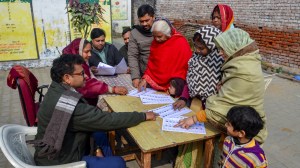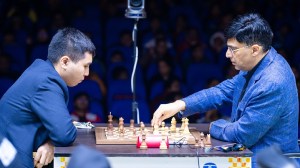Sharp-tongued Zhu cuts US down to size
WASHINGTON, APRIL 9: It was an unusually warm Spring day in Washington on Thursday -- 28.4 degrees C -- but it wasn't just the temperatur...

WASHINGTON, APRIL 9: It was an unusually warm Spring day in Washington on Thursday 8212; 28.4 degrees C 8212; but it wasn8217;t just the temperature that had the American leadership hot under the collar.
In one of the most extraordinary performances by a visiting dignitary, Chinese Premier Zhu Rongji gave the United States a public dressing down that the Clinton administration is unlikely to forget in a hurry.
Consider this: Asked at a press conference about allegations that China had stolen nuclear secrets from the US, Zhu denied it and tartly suggested to his hosts that Beijing was unlikely to steal anything from a country which could not make decent microphones the mikes in the White House had malfunctioned a little earlier.
8220;I don8217;t think there can be such problem nuclear espionage given the tight security measures in the United States and advanced technology,8221; he continued sarcastically as a red-faced Clinton looked on. 8220;I hope you don8217;t underestimate your own ability to keep secrets, and don8217;tunderestimate the capability of the Chinese people to develop their own technology.8221;
That was just the beginning. Later, when he was asked about US condemnation of human rights in China, Zhu indicated clearly that Beijing resented Washington8217;s views on the matter. Explaining that different countries had different conditions which altered the concept of human rights food and health were more important to the Chinese, he said, Zhu gibed that before he came to America, his friends mailed him lot of material about the human rights problem in the United States.
8220;But I haven8217;t brought them with me. I don8217;t want to hand that over to President Clinton because I trust you are able to resolve your own problems,8221; Zhu pointedly said looking at the US President.
These were two of the many instances where the outspoken Zhu singed his bewildered hosts with corrosive replies. When reporters asked him about allegations that China had illegally funnelled money into Clinton8217;s election campaign, Zhu riposted, 8220;Whyjust 300,000? That would be foolish!8221; China had foreign exchange reserves of 146 billion and could have spared at least 10 billion, he joked.
The Chinese leader completely dominated the 90-minute White House news conference with his devastating candor as he sought to disabuse the American audience of its notions about China, leaving the US President hardly 15 minutes of talking time. Even the normally glib Clinton was often lost for words, and his entire cabinet sat shell-shocked on the front row as Zhu let loose a fusillade of trenchant repartees.
Later in the evening, at a White House dinner, a roasted Clinton toasted Zhu, noting the Chinese premier had said only good friends tell each other what they really think. 8220;If you8217;re right about that, you have turned out to be quite a good friend indeed,8221; Clinton said.
Zhu, a qualified engineer with a reputation for being blunt, came on this trip despite grave doubts on account of the recent tensions in ties between the two countries because of thespying allegations and the differences on Yugoslavia. But in doing so, he also showed that the Chinese were not averse to doing business even in adverse circumstances if they saw some benefit in it. Although he is said to speak fluent English, he chose to speak in Mandarin, often making elaborate replies to explain the Chinese position.
8220;To tell you the truth, I was reluctant to come,8221; Zhu said at the news conference, before launching into an explanation about how important it was for China to enter the World Trade Organisation, something the US has been blocking. But evidently, the talks between the two leaders did not succeed in bridging the gap.
Although China made significant concessions, the US side did not think it was sufficient to back its entry to the WTO. 8220;In my view, the gap between the two sides is not all that significant, although Mr President does not quite agree with me on that,8221; Zhu said in yet another flash of candor. 8220;The problem lies not with the big difference or big gap, butwith the political atmosphere in the United States.8221;
On their part, the Americans, distracted as they were with the Balkan crisis, treated Zhu8217;s visit 8212; coming less than two years after President Jiang Zemin8217;s visit 8212; with great importance and dignity.
Clinton himself was calm and graceful even in the face of some toxic remarks by the Chinese leader. Only once 8212; when Zhu compared any potential Chinese military action against Taiwan to the action taken by Abraham Lincoln to keep the US united 8212; did Clinton step in, saying 8220;the facts of the relationship between China and Taiwan over the last 50 years are somewhat different than the facts leading to the American Civil War.8221;
- 01
- 02
- 03
- 04
- 05































